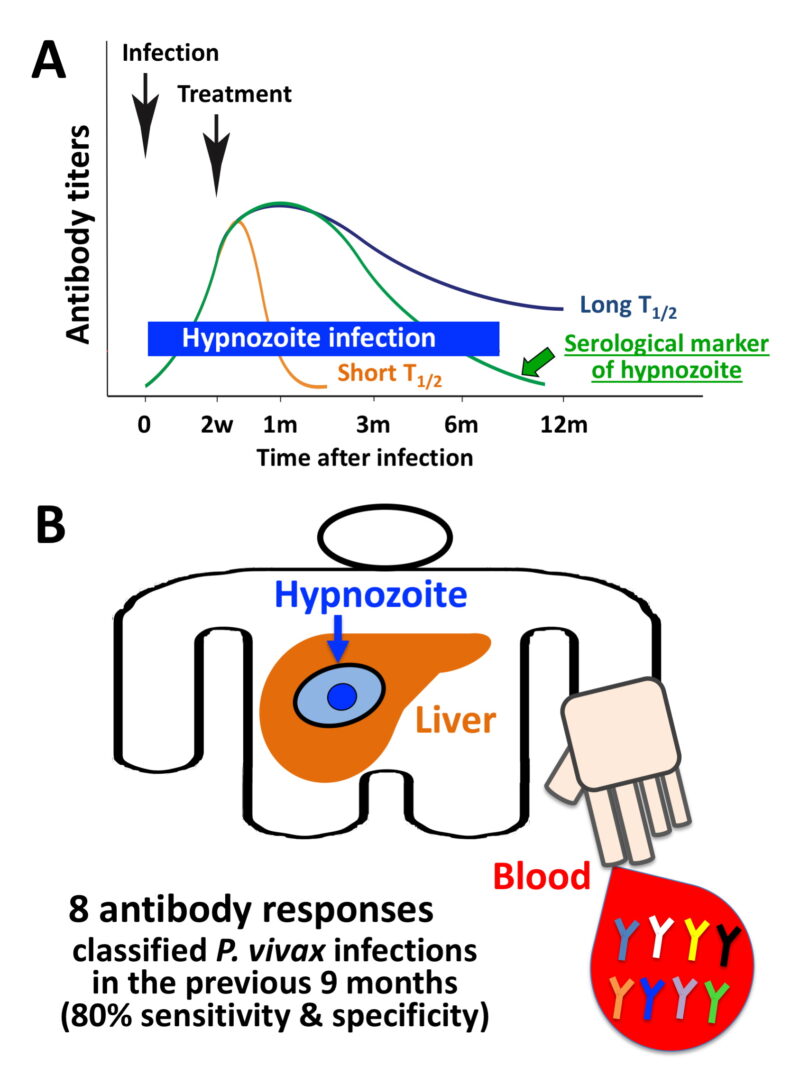Blood test as a potential new weapon in the fight to eliminate malaria
Development and validation of serological markers for detecting recent Plasmodium vivax infection
An international collaborative team from PROS Ehime University and CellFee Science, Japan; the Walter and Eliza Hall Institute, Australia; Pasteur Institute, France; and Foundation for Innovative New Diagnostics, Switzerland developed a new diagnostic blood test which detects recent exposure to ‘vivax’ malaria. The new test can also identify people who may harbor dormant liver-stage malaria parasites, which can cause illness. This new diagnostic approach has the potential to enhance malaria surveillance and accelerate elimination.
Plasmodium vivax is the most widespread malaria parasite worldwide, with up to two billion people at risk of infection. As well as causing illness and death in its ‘active’ stage of infection, the parasite can hide as hypnozoites, a dormant stage, in the liver, and is a significant cause of ‘relapsing’ malaria.
These hypnozoites, undetectable with current diagnostics, can be responsible for >80% of all blood-stage infections. Identifying and targeting individuals with hypnozoites is thus essential for accelerating and achieving malaria elimination. A major gap in the P. vivax elimination toolkit is the identification of individuals carrying clinically silent and undetectable hypnozoites.
This study developed a panel of serological exposure markers capable of classifying individuals with P. vivax infections within the previous 9 months who have a high likelihood of harboring hypnozoites. 1) We measured IgG antibody responses with the AlphaScreen system to 342 P. vivax proteins expressed by a wheat germ cell-free system, invented at Ehime University, in longitudinal clinical cohorts conducted in Thailand and Brazil and identified 60 candidate serological markers of exposure. 2) Candidate markers were validated using samples from year-long observational cohorts conducted in Thailand, Brazil and the Solomon Islands and antibody responses to eight P. vivax proteins classified P. vivax infections in the previous 9 months with 80% sensitivity and specificity. Mathematical models demonstrate that a serological testing and treatment strategy could reduce P. vivax prevalence by 59–69%.
These eight antibody responses can serve as a biomarker, identifying individuals who should be targeted with anti-hypnozoite therapy. The test offers new opportunities for improving malaria control and elimination strategies.
Reference URL: https://www.nature.com/articles/s41591-020-0841-4
Bibliographic Information
Rhea J. Longley, Michael T. White, Eizo Takashima, Jessica Brewster, Masayuki Morita, Matthias Harbers, Thomas Obadia, Leanne J. Robinson, Fumie Matsuura, Zoe SJ Liu, Connie S. N. Li-Wai-Suen, Wai-Hong Tham, Julie Healer, Christele Huon, Chetan E. Chitnis, Wang Nguitragool, Wuelton Monteiro, Carla Proietti, Denise L. Doolan, Andre M. Siqueira, Xavier C. Ding, Iveth J. Gonzalez, James Kazura, Marcus Lacerda, Jetsumon Sattabongkot, Takafumi Tsuboi, Ivo Mueller, Nature Medicine, 26, 741-749, doi: 10.1038/s41591-020-0841-4, 2020 (May 12).
Fundings
- Global Health Innovative Technology (GHIT) Fund (T2015-142)
- JSPS KAKENHI (JP15H05276 & JP16K15266)
- United States National Institute of Allergy and Infectious Diseases (5R01 AI 104822 & 5U19AI089686-06)
- Australian National Health and Medical Research Council (1092789, 1134989 & 1143187)
- The Walter and Eliza Hall Institute Innovation Fund
- TransEPI consortium (supported by the Bill & Melinda Gates Foundation)
- National Research Council of Thailand, Howard Hughes Medical Institute
- Wellcome Trust (UK)
- Brazilian National Council for Scientific and Technological Development
- United Kingdom Government
Fundings
- Japan Society for the Promotion of Science(JSPS) KAKENHI Grant Number JP17H03044,
- Japan Science and Technology Agency (JST) MIRAI grants (JPMJMI18GC)
Media
-

Hypnozoite: serological markers for detecting dormant Plasmodium vivax infection
(A) How to detect dormant hypnozoite of P. vivax?
Antibodies can predict recent infections, if they have the correct kinetic profile (Green line, serological marker of hypnozoite). Antigens selected based on the kinetic profiles in 9 months following clearances of infections are candidates for detecting hypnozoites.
(B) Hypnozoite biomarkers.
Eight antibody responses classified P. vivax infections in the previous 9 months with 80% sensitivity & specificity.
credit : Ehime University
Usage Restriction : Please get copyright permission
Contact Person
Name : Eizo Takashima
Phone : +81-89-927-9939
E-mail : takashima.eizo.mz@ehime-u.ac.jp
Affiliation : Proteo-Science Center (PROS)

